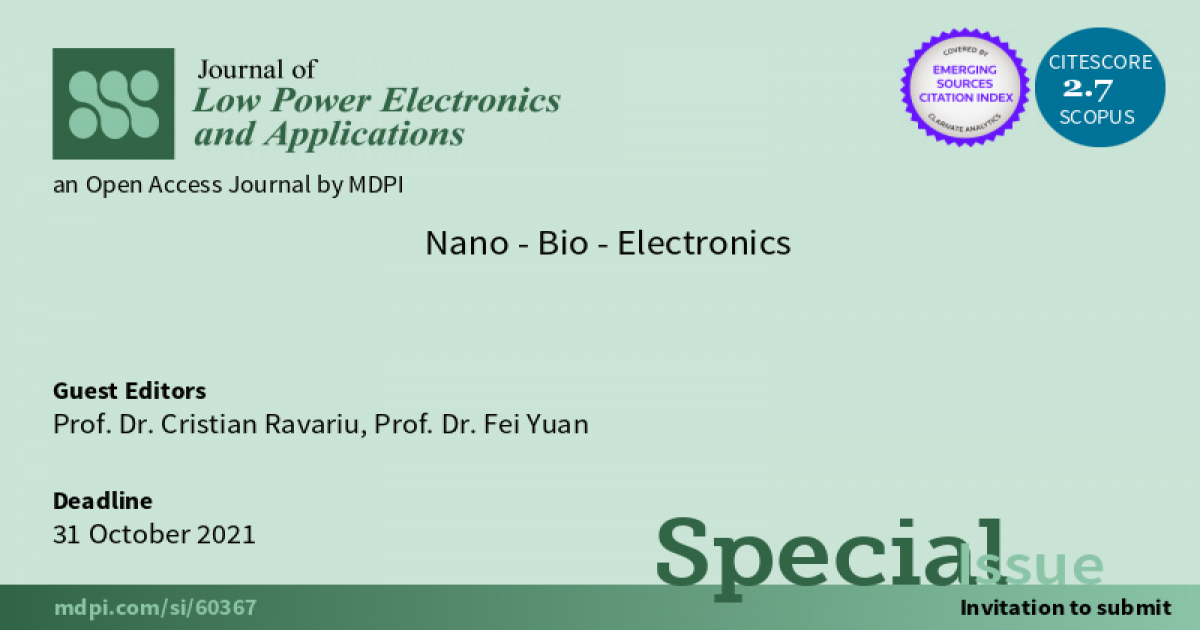Nano-Bio-Electronics
A special issue of Journal of Low Power Electronics and Applications (ISSN 2079-9268).
Deadline for manuscript submissions: closed (31 October 2021) | Viewed by 828

Special Issue Editors
Interests: organic transistors; biosensors; enzyme-FET modelling; co-integration techniques
Special Issues, Collections and Topics in MDPI journals
Interests: CMOS integrated circuits and systems for data communications; CMOS time-mode circuits and systems; analog-to-digital converters; and passive wireless microsystems
Special Issues, Collections and Topics in MDPI journals
Special Issue Information
Dear Colleagues,
Moore's law has been rigorously fulfilled and, by 2021, it seems CMOS technology will reach its ultimate limit. The main challenge of contemporary electronics comes from nano-devices and biomaterials co-integration into CMOS circuits. In the post-MOS era, a confluence of nano-electronics with organic semiconductors and biomaterials is expected.
Authors are invited to submit their regular papers following the JLPEA submission guidelines for the Special Issue "Nano-Bio-Electronics". Topics include but are not limited to the following:
- Nanoelectronics, nano-devices, nanoscale, quantum devices;
- Low size, low power electronics;
- Biomaterials and organic layers co-integration on inorganic substrates;
- Biosensors with enzymes, antibodies, cells, or DNA near electronic devices;
- Circuit advances for low power electronics, nano-circuits, neuromorphic circuits.
Prof. Dr. Cristian Ravariu
Prof. Dr. Fei Yuan
Guest Editors
Manuscript Submission Information
Manuscripts should be submitted online at www.mdpi.com by registering and logging in to this website. Once you are registered, click here to go to the submission form. Manuscripts can be submitted until the deadline. All submissions that pass pre-check are peer-reviewed. Accepted papers will be published continuously in the journal (as soon as accepted) and will be listed together on the special issue website. Research articles, review articles as well as short communications are invited. For planned papers, a title and short abstract (about 100 words) can be sent to the Editorial Office for announcement on this website.
Submitted manuscripts should not have been published previously, nor be under consideration for publication elsewhere (except conference proceedings papers). All manuscripts are thoroughly refereed through a single-blind peer-review process. A guide for authors and other relevant information for submission of manuscripts is available on the Instructions for Authors page. Journal of Low Power Electronics and Applications is an international peer-reviewed open access quarterly journal published by MDPI.
Please visit the Instructions for Authors page before submitting a manuscript. The Article Processing Charge (APC) for publication in this open access journal is 1800 CHF (Swiss Francs). Submitted papers should be well formatted and use good English. Authors may use MDPI's English editing service prior to publication or during author revisions.
Keywords
- Nanoscale
- Nanoelectronics
- Nanotechnology
- Vacuum nano-transistors
- Nano-circuits
- Sub-28nm CMOS
- Organic electronics
- Nano-core-shell transistors
- Carbon nanotubes
- Nano-wires
- Co-integration
- Bio-FETs
- Extended-Gate
- ISFET
- Enzyme-FET
- Cells-Electronics
- Biosensors
- Biomaterials
- New materials for low power electronics
- Solar cells
- Neuromorphic circuits
- Ionic channels
- Neural electrodes
Benefits of Publishing in a Special Issue
- Ease of navigation: Grouping papers by topic helps scholars navigate broad scope journals more efficiently.
- Greater discoverability: Special Issues support the reach and impact of scientific research. Articles in Special Issues are more discoverable and cited more frequently.
- Expansion of research network: Special Issues facilitate connections among authors, fostering scientific collaborations.
- External promotion: Articles in Special Issues are often promoted through the journal's social media, increasing their visibility.
- e-Book format: Special Issues with more than 10 articles can be published as dedicated e-books, ensuring wide and rapid dissemination.
Further information on MDPI's Special Issue polices can be found here.






